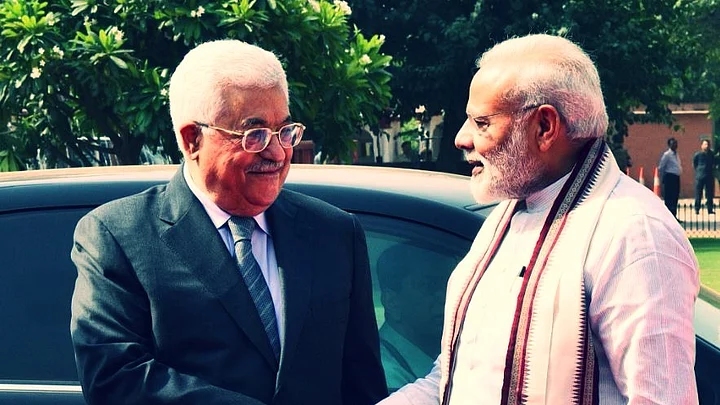Narendra Modi is going to be the first Indian Prime Minister to visit Israel and this had many wondering if India was stepping away from its long-held stance on the Palestine issue. Palestine President Mahmoud Abbas’ State visit to India was under scrutiny to see how he would respond to India’s increasing closeness to Israel. But the official meetings ended with a consensus on both sides that India’s commitment to Palestine remains the same.
Prime Minister Narendra Modi said that India strongly backs a political solution to the Israel-Palestine issue through sustained dialogue and said that he hopes for an early resumption of talks. He added that India has been “unwavering in its support of the Palestinian cause”.
“And, we hope to see the realisation of a sovereign, independent, united and viable Palestine, coexisting peacefully with Israel,” he said.
Abbas said that Palestine appreciated the solidarity that India extends to its cause.
India is a friend. It has influence at the international level. India can play an important role (in resolving the Palestine-Israel crisis).
Before Abbas landed in Delhi, Dr Majdi Khaldi, a senior Palestinian official, had called the India-Palestine relationship “steady”. He had said that India has the right to have relations with Israel or any other country and all that’s important to Palestine is that none of these are the cost of the long-standing relationship between India and Palestine.
While India has supported the cause of Palestine from the start, it only established diplomatic relations with Israel in 1992. But by 2017, the two countries have more than made up for this delay through a fast expanding relationship that includes not just trade but defence deals and science and technology collaboration. Israel is India’s third-largest defence supplier and India is Israel’s largest defence buyer.
The visit by PM Modi, scheduled for July, and the strong statements in support of Palestine that he made during President Abbas’ visit all signal that India no longer feels the need to downplay either of these bilateral relationships. Palestine seems secure in its belief that India supports its cause, and Israel’s trade and tourism ties with India seem unaffected by this.
India, on its part, is seemingly more aware of its own role in the West Asian region. It is working on the principle that lip service to the Palestinian cause and some monetary commitments to Palestine’s development are enough to keep its commitment to the nation alive. While this may seem like too little, it is no departure from the path that India has followed with Palestine for decades.
India has come to the conclusion that increasing its closeness to Israel doesn’t compromise its support for Palestine. It took India over four decades to decide to be friends with Israel but it took another two and half for it to stop treating that relationship like a secret.
(At The Quint, we question everything. Play an active role in shaping our journalism by becoming a member today.)
